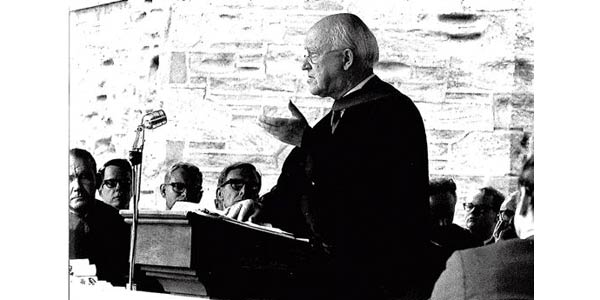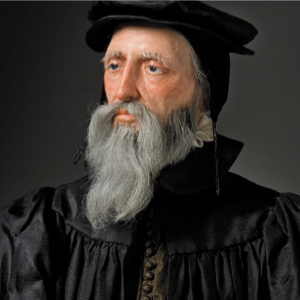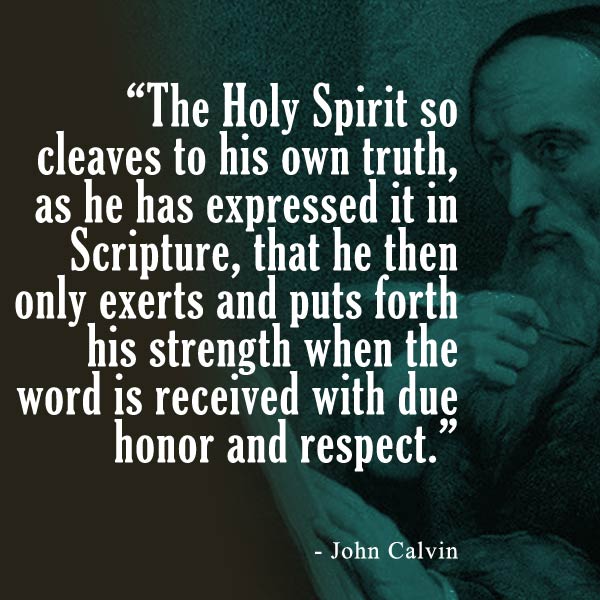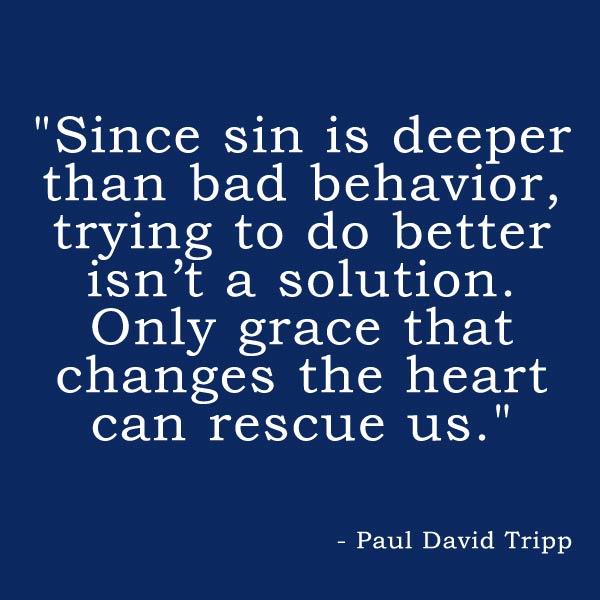Exposition of 2 Corinthians 5:20-21 (from the 2016 Shepherd’s Conference):
Paul Washer
 by D. Martyn Lloyd-Jones
by D. Martyn Lloyd-JonesWhat is the place of prayer in your life? What prominence does it have in our lives? It is a question that I address to all. It is as necessary that it should reach the man who is well versed in the Scripture, and who has a knowledge of its doctrine and its theology, as that it should reach anyone else. What part does prayer play in our lives and how essential is it to us? Do we realize that without it we faint? Our ultimate position as Christians is tested by the character of our prayer life. It is more important than knowledge and understanding. Do not imagine that I am detracting from the importance of knowledge. I spend most of my life trying to show the importance of having a knowledge of truth and an understanding of it. That is vitally important. There is only one thing that is more important, and that is prayer. The ultimate test of my understanding of the Scriptural teaching is the amount of time I spend in prayer. As theology is ultimately the knowledge of God, the more theology I know, the more it should drive me to seek to know God. Not to know about Him, but to know Him. The whole object of salvation is to bring me to a knowledge of God. I may talk learnedly about regeneration, but what is eternal life? It is that they might know Thee, the only true God in Jesus Christ whom God has sent. If all my knowledge does not lead me to prayer there is something wrong somewhere. It is meant to do that. The value of the knowledge is that it gives me such an understanding of the value of prayer, that I devote time to prayer and delight in prayer. If it does not product these results in my life, there is something wrong and spurious about it, or else I am handling it in a wrong manner.
-----
Session 1 Part 1
Session 1 Part 2
Session 2 Part 1
Session 2 Part 2
Session 3
Session 4
To students of the Bible who want to further their theological education, but don't have the time or money to attend seminary, there are some outstanding free online options.
The following is a list of some resources for a free (non-credit) theological education online:

 by John Calvin
by John CalvinThat this distinction may be the more manifest, we must consider that the Providence of God, as taught in Scripture, is opposed to fortune and fortuitous causes. By an erroneous opinion prevailing in all ages, an opinion almost universally prevailing in our own day, viz., that all things happen fortuitously, the true doctrine of Providence has not only been obscured, but almost buried. If one falls among robbers, or ravenous beasts; if a sudden gust of wind at sea causes shipwreck; if one is struck down by the fall of a house or a tree; if another, when wandering through desert paths, meets with deliverance; or, after being tossed by the waves, arrives in port, and makes some wondrous hair-breadth escape from death – all these occurrences, prosperous as well as adverse, carnal sense will attribute to fortune. But whose has learned from the mouth of Christ that all the hairs of his head are numbered, (Matt 10:30) will look farther for the cause, and hold that all events whatsoever are governed by the secret counsel of God. With regard to inanimate objects again we must hold that though each is possessed of its peculiar properties, yet all of them exert their force only in so far as directed by the immediate hand of God. Hence they are merely instruments, into which God constantly infuses what energy he sees meet, and turns and converts to any purpose at his pleasure.
This series was previously published by Tolle Lege Press. Reformation Heritage Press has taken over the series, and all of the previous volumes soon will be available again, along with Joel Beeke's new volume on Revelation.
 by John Calvin
by John CalvinHow the Spirit and the written Word are indissolubly connected.
{The] cavil about our cleaving to the dead letter carries with it the punishment which they deserve for despising Scripture. It is clear that Paul is there arguing against false apostles, (2 Corinthians 3:6,) who, by recommending the law without Christ, deprived the people of the benefit of the New Covenant, by which the Lord engages that he will write his law on the hearts of believers, and engrave it on their inward parts. The letter therefore is dead, and the law of the Lord kills its readers when it is dissevered from the grace of Christ, and only sounds in the ear without touching the heart. But if it is effectually impressed on the heart by the Spirit; if it exhibits Christ, it is the word of life converting the soul, and making wise the simple. Nay, in the very same passage, the apostle calls his own preaching the ministration of the Spirit, (2 Corinthians 3:8,) intimating that the Holy Spirit so cleaves to his own truth, as he has expressed it in Scripture, that he then only exerts and puts forth his strength when the word is received with due honor and respect.
Augustine and the Calvinistic tradition in general define the will's freedom, or lack thereof, in relation to sin. Why? Because this is how the Bible defines it. Jesus declared "everyone who practices sin is a slave to sin. ... So if the Son sets you free, you will be free indeed." (John 8:34-36) Augustine understood that before the fall, Adam was "able to sin and able not to sin", that he, as representative of the human race, was in a probationary state, not sealed in righteousness (like the glorified saints).
Likewise regarding man's condition after the fall he said we are in the sad condition of being "not able not to sin" So Augustine understood the Bible to be teaching that Adam (pre-fall) was free in regards to sin's bondage but his willful act rendered his post-fall descendants to be in bondage to corruption; to have a will that is no longer free at all (apart from grace) to make God-pleasing redemptive choices. It is worthwhile to remember this in your discussions about free will, because the historical debate about free will refers to man's condition in sin after the fall.
----
Related Resources
Human Nature in Its Fourfold State Thoughts on Augustine's View on the Will
Human Nature in its Fourfold State (eBook) by Thomas Boston
-----
Quotes
"To will is of nature, but to will aright is of grace." - Augustine
If man has lost his freedom, and is forced to serve sin, and cannot will good, what conclusion can more justly be drawn concerning him, than that he sins and wills evil necessarily?" - Martin Luther BW pg. 149
 by Nicholas Batzig
by Nicholas BatzigMany of those who have been born of God’s Spirit can testify to the reality of having been regenerated upon hearing a particular sermon. Some, upon hearing a sermon for the first time, were converted–immediately brought from death to life. Others, after sitting under the preaching of God’s word for many years, finally experience the remarkable work of God in their souls in giving them new life in Christ. I belong to the latter group, namely, those who grew up in the church and heard the Gospel hundreds, if not thousands, of times but who, finally came to repentance and faith in my mid-twenties. After I was converted, I couldn’t listen to enough sermons–both in the local church to which I belonged, as well as online. Sermons seemed to have a greater impact on my soul even than reading theological works. I suppose that is, in part, on account of the fact that God promised to bless the preaching of His word in a unique and unparalleled manner (1 Cor. 1:18, 21). Here are what I would consider to be 10 life changing sermons that I’ve heard (either in person or online) over the past 15 years:
 by Paul David Tripp
by Paul David TrippSince sin is deeper than bad behavior, trying to do better isn’t a solution. Only grace that changes the heart can rescue us.
There is a difference between a person in whom disappointment leads to self-reformation and someone in whom grief leads to heartfelt confession. I think that we often confuse the two. The first person believes in personal strength and the possibility of self-rescue, while the second has given up on his own righteousness and cries out for the help of another. One gets up in the morning and tells himself that he’ll do better today, but the other starts the day with a plea for grace. One targets a change in behavior, and the other confesses to a wandering heart. One assesses that he has the power for personal change, while the other knows that he needs to be given strength for the battle. One has to hold on to the possibility of personal reformation, but the other has abandoned that hope and therefore runs to God for help.
Self-reliant personal reformation and the penance that follows is the polar opposite of heartfelt confession with the repentance that follows. People who acknowledge that what they’ve done is wrong and then immediately lay out plans to do better unwittingly deny what the gospel of Jesus Christ says about them, how real change takes place, and where help can be found. What they have omitted or neglected is confession. When you confess your sins to God, you don’t just admit that you have sinned; no, you also confess that you have no power to deliver yourself from the sin you have just confessed. True confession always combines an admission of wrong with a plea for help. The heart then, encouraged by the forgiveness and presence of Jesus, longs to live in a new, better way (repentance).